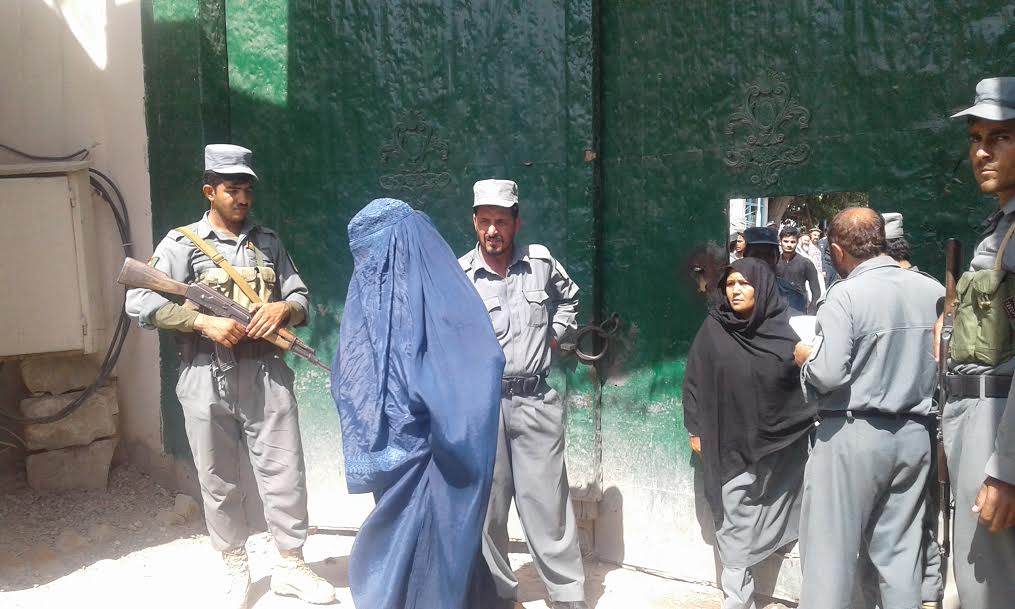ASADABAD (Pajhwok): Female prisoners from eastern Kunar province are kept in jails in neighboring Nangarhar province for the lack of required facilities.
Official says the transfer of female prisoners from Nangarhar to Kunar for investigation is a problematic process.
Prison officials
Mohammad Yousuf, deputy in charge of Kunar jail, says they bring female prisoners to Kunar from Nangarhar when prosecutors want to investigate their cases and then the females are sent back to the jails.
“It is a problematic process to bring prisoners from one province for investigation to another and take back despite security threats on the way,” he said
Yousuf said they had nine policewomen in the past but currently there was only one policewoman who attended the office once a week for searching of prisoners.
He said if the issue of the lack of policewomen in Kunar was resolved, there would be no need for keeping Kunar female prisoners in Nangarhar jails.
Judiciary officials:
Abdul Ahad Haidari, head of the appellant attorney’s office, said there were no exclusive posts for female attorneys and the number of female defense lawayers was insufficient.
He said the Attorney General Officer (AGO) had introduced one female attorney officer to the Kunar attorney’s office. “The presence of female attorneys helps in investigation of women inmates.”
Jamaluddin, head of the provincial judicial courts, said there was no female judge or defence lawyer in Kunar. He said an NGO worked for women’s rights in Kunar but its employees were male. “The NGO provides help to violence-affected women and defend their cases.”
Women employees:
Due to local customs and traditions, most women in Kunar decline to work in government institutions, but the cultural restrictions issue has been somehow resolved recently.
Latifa, executive director at women’s affair department, said she joined the department with the consent of her family. “Initially some people talked about my decision, but now they have stopped,” she said. Latifa said she faced no issue currently but in the beginning she faced problems while coming to office.
Ilhamia, another worker at the women’s affairs department, said she faced opposition from her family and in-laws when she joined the government job 13 years ago. She felt no worries after her husband allowed her to work.
Muslima, a student of the Kunar University, said women’s education level was low in Kunar and thus they were denied jobs. The cultural and traditional curbs were other problems women faced, she said, adding a woman would never wish to work in office where only men worked.
Tribal elders and people
A tribal elder,Haji Shamsur Rahman said women had no interest in government jobs in Kunar because of the absence of a proper working environment for them.
He said women refused to work in government offices because they feared male colleagues would harass them and take their photos on mobile phones.
Samiullah, a resident of Sirkani district, said women should be aware about their rights because they had the same rights as men.
“Women feel they are controlled by their fathers and husbands so they do not express interest in government jobs,” Samiullah said. “Women’s related cases remain unaddressed and their rights are violated due to absence of female officers in security and judiciary organs,” he added.
Safar Safi, a resident of Asadabad, the capital of Kunar, said women did not want to work in government offices against a meager salary.
Government officials
Kunar Central Jail’s deputy chief Col. Mohammad Yousuf said they could not keep female prisoners in the jail and had to shift them to Nangarhar. He said there were no female police or inmates in Kunar.
Sixteen women have been sentenced to different jail terms in Kunar over the past six years and all of them are held in Nangarhar prisons.
Nangarhar Central Jail head Abdul Wali Hesarak confirmed Kunar female prisoners were kept in Nangarhar jails. He said there were no facilities for female prisoners in Kunar, therefore they were shifted to Nangarhar.
Kunar governor’s spokesman, Abdul Ghani Musamim, said women did not show interest to join police ranks due to cultural and traditional restrictions.
He said they preferred recruitment of educated women in police, but no woman had so far requested to serve in the area.
“Some women work in educational and health sectors, but they do not want to work in other fields despite they can receive more privileges beside salaries,” he said.
Provincial police chief Maj. Gen. Juma Gul Hemmat said 42 female police performed in the provincial police headquarters. Seven were sergeants and the rest were constables, he said of the policewomen.
He said they were able to recruit seven female police after they were encouraged by tribal elders and ulema.
He said female officers were in the passport office, courts, women’s affairs departments and the governor’s house. “We have very good conditions for female police so they can discharge their duty effectively,” Hemmat said.
Kuanr women’s affairs director, Sahla Babar, said violence against women had increased in the province and that women showed no interest to work in government offices.
“We have nine females in our 14 member staff at the women’s affairs department,” she said. Babar asked the government to increase jobs for women in government organs.
She said there was no female judge or prosecutor in Kunar and women hardly followed their cases.
A religious scholar, Mualvi Obaidullah Bahari said Islam ordered good treatment and prevention of violence against women. “Islam says education is mandatory for men and women. Illiteracy is the reason of violence against females in our society”, she said.
nh/mds/ma







GET IN TOUCH
NEWSLETTER
SUGGEST A STORY
PAJHWOK MOBILE APP